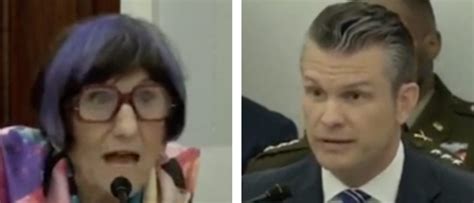
DeLauro aggressively pressed Fox News host Pete Hegseth for specifics on his sources and evidence concerning alleged political interference within the federal government during a House Appropriations Committee hearing on Wednesday. The heated exchange occurred as Hegseth testified about what he described as the weaponization of the federal bureaucracy against conservatives.
Representative Rosa DeLauro, a Democrat from Connecticut, repeatedly demanded Hegseth provide concrete details and names to substantiate his claims. “Give us the details! Give us the names!” DeLauro exclaimed, visibly frustrated by Hegseth’s responses which she perceived as evasive and lacking in verifiable information. The confrontation highlighted the deep partisan divide surrounding accusations of political bias within government agencies and the challenges of obtaining concrete evidence to support such allegations. The hearing, intended to explore oversight and accountability, quickly devolved into a partisan battleground, showcasing the intense scrutiny facing media figures and their roles in shaping public discourse on sensitive political issues. Hegseth, known for his conservative viewpoints and criticisms of the Biden administration, maintained that his claims were based on credible sources and patterns of behavior he has observed.
The tense exchange underscored the ongoing debate about the role of media in holding government accountable and the potential for political agendas to influence narratives surrounding government operations. DeLauro’s forceful questioning reflects the Democratic party’s skepticism toward claims of widespread political bias within the federal government and their determination to challenge what they view as unsubstantiated accusations. The confrontation also raises broader questions about the burden of proof in political discourse and the responsibility of media figures to provide verifiable information to support their claims.
During the House Appropriations Committee hearing, Hegseth presented his views on the alleged weaponization of the federal bureaucracy against conservatives. DeLauro, ranking member of the committee, challenged Hegseth’s assertions, demanding specifics and evidence to support his claims. “You’re making serious allegations,” DeLauro stated, “Where’s the beef? Give us chapter and verse!”
Hegseth responded by citing what he described as a pattern of behavior and a series of incidents that, in his view, demonstrated a bias against conservatives within the federal government. He alluded to sources within government agencies who had shared information with him, but he refrained from providing specific names or documents, citing concerns about protecting the identities of his sources.
DeLauro pressed further, insisting that Hegseth provide concrete evidence to back up his claims. “With all due respect, you’re not under oath, but you’re before this committee,” she said. “You’re saying that federal employees are weaponized. Who are they? What agencies? Give us the details!”
Hegseth reiterated his concerns about protecting his sources and argued that providing specific names would expose them to potential retaliation. He maintained that the pattern of behavior he had observed was sufficient to warrant further investigation.
The exchange continued for several minutes, with DeLauro repeatedly demanding specifics and Hegseth refusing to provide them. The confrontation highlighted the challenges of investigating claims of political bias within government agencies and the difficulties of obtaining verifiable evidence to support such allegations.
The incident comes amid growing concerns about the politicization of government institutions and the erosion of trust in public institutions. Both Democrats and Republicans have accused the other side of using government agencies for political purposes, and the debate over these issues has become increasingly heated in recent years.
The confrontation between DeLauro and Hegseth also raises broader questions about the role of media in holding government accountable. Media figures often play a critical role in exposing wrongdoing and informing the public about important issues. However, they also face challenges in verifying information and protecting their sources. The incident underscores the importance of responsible journalism and the need for media figures to provide accurate and verifiable information to support their claims.
The hearing also served as a platform for broader discussions about government oversight and accountability. Members of the committee questioned Hegseth about his views on a range of issues, including the role of Congress in overseeing government agencies and the importance of protecting whistleblowers who come forward with information about wrongdoing.
The confrontation between DeLauro and Hegseth is likely to fuel further debate about the politicization of government institutions and the role of media in holding government accountable. The incident underscores the importance of critical thinking and the need for citizens to carefully evaluate information from all sources. It also highlights the challenges of addressing complex issues in a polarized political environment.
The intense back-and-forth between DeLauro and Hegseth underscores the complexities of navigating accusations of political bias and the burden of proof required to substantiate such claims. As the debate surrounding the weaponization of government continues, the need for transparency, verifiable evidence, and responsible journalism remains paramount. The confrontation also highlights the importance of robust government oversight and the protection of whistleblowers who are willing to come forward with information about potential wrongdoing.
The incident has sparked widespread discussion on social media and in the media, with commentators on both sides of the political spectrum weighing in on the confrontation. Some have praised DeLauro for her forceful questioning of Hegseth, while others have criticized her for what they see as a partisan attack. Still others have defended Hegseth’s right to express his views and protect his sources. The debate is likely to continue in the days and weeks ahead, as the issue of political bias in government remains a contentious one.
Expanded Context and Background:
Pete Hegseth is a prominent conservative commentator and television host, known for his strong views on political and social issues. He has been a vocal critic of the Biden administration and has frequently accused the left of attempting to silence conservative voices. Hegseth’s commentary often focuses on what he perceives as the weaponization of government agencies against conservatives and the erosion of traditional American values. He has a significant following among conservatives and is a regular guest on various news programs.
Rosa DeLauro is a seasoned Democratic Congresswoman representing Connecticut’s 3rd congressional district. She has served in the House of Representatives since 1991 and is known for her advocacy on issues such as affordable healthcare, education, and economic justice. DeLauro is a staunch defender of government programs and has been a vocal critic of Republican efforts to cut funding for social services. She is a respected figure within the Democratic party and is known for her sharp questioning and passionate defense of her political beliefs.
The House Appropriations Committee is responsible for allocating federal funds to various government agencies and programs. The committee plays a critical role in shaping the federal budget and overseeing government spending. The committee is composed of members from both parties and is typically the site of intense political debate over spending priorities. The hearings held by the committee often provide a platform for government officials, experts, and members of the public to share their views on important issues.
The issue of political bias within government agencies has become increasingly contentious in recent years. Republicans have accused the Biden administration of using government agencies to target conservatives, while Democrats have accused the Trump administration of doing the same. These accusations have fueled partisan divisions and have made it difficult to find common ground on important issues.
The debate over the weaponization of government has also raised concerns about the erosion of trust in public institutions. When people believe that government agencies are being used for political purposes, it can undermine their confidence in the fairness and impartiality of those agencies. This can lead to a decline in civic engagement and a weakening of democratic institutions.
The role of media in holding government accountable is essential. Media figures play a critical role in exposing wrongdoing and informing the public about important issues. However, they also face challenges in verifying information and protecting their sources. The incident between DeLauro and Hegseth underscores the importance of responsible journalism and the need for media figures to provide accurate and verifiable information to support their claims.
The confrontation between DeLauro and Hegseth also highlights the importance of critical thinking and the need for citizens to carefully evaluate information from all sources. In a polarized political environment, it is essential to be able to distinguish between facts and opinions and to be aware of the potential for bias. Citizens should seek out information from multiple sources and should be skeptical of claims that are not supported by evidence.
The incident also raises broader questions about the burden of proof in political discourse. When making serious allegations, it is important to have credible evidence to support those claims. Without evidence, accusations can be easily dismissed as partisan attacks. This can make it difficult to address important issues and to hold government accountable.
In-Depth Analysis:
The confrontation between Representative DeLauro and Pete Hegseth during the House Appropriations Committee hearing encapsulates the deeply entrenched partisan divisions that permeate American politics. The core of the dispute centers on the contentious issue of whether federal government agencies are being weaponized against conservative viewpoints. Hegseth’s claims of political bias within these institutions are met with strong skepticism and demands for concrete evidence by DeLauro, highlighting a fundamental disagreement on the nature and extent of such alleged bias.
DeLauro’s aggressive questioning reflects a broader concern among Democrats that accusations of political bias are often used to undermine trust in government institutions without sufficient factual basis. Her insistence on specific details, names, and evidence underscores the importance of verifiable information in political discourse and the need to avoid spreading unsubstantiated claims.
Hegseth’s reluctance to provide specific names or documents, citing the need to protect his sources, raises complex questions about the balance between transparency and the protection of whistleblowers. While the anonymity of sources can be essential for encouraging individuals to come forward with information about potential wrongdoing, it also makes it more difficult to verify the accuracy of the claims being made.
The incident also sheds light on the role of media figures in shaping public perceptions of government and politics. Hegseth, as a prominent conservative commentator, has a significant platform to disseminate his views and influence public opinion. His claims about the weaponization of government resonate with many conservatives who believe that their viewpoints are being unfairly targeted. However, his lack of specific evidence raises questions about the credibility of his claims and the potential for his commentary to contribute to the erosion of trust in government.
The confrontation between DeLauro and Hegseth underscores the importance of critical thinking and media literacy in today’s political environment. Citizens need to be able to evaluate information from various sources, assess the credibility of those sources, and distinguish between facts and opinions. They also need to be aware of the potential for bias and to avoid blindly accepting claims that are not supported by evidence.
The issue of political bias within government agencies is likely to remain a contentious one for the foreseeable future. As long as partisan divisions persist, accusations of weaponization will continue to be made, and it will be difficult to find common ground on how to address these concerns. However, by focusing on transparency, verifiable evidence, and responsible journalism, it may be possible to foster a more productive dialogue about these important issues.
The incident serves as a reminder of the importance of robust government oversight and the need to protect whistleblowers who are willing to come forward with information about potential wrongdoing. Congress has a responsibility to ensure that government agencies are operating fairly and impartially and that individuals who expose misconduct are protected from retaliation. By strengthening oversight mechanisms and whistleblower protections, it may be possible to reduce the risk of political bias and to promote greater accountability within government.
The exchange between DeLauro and Hegseth also highlights the challenges of navigating complex issues in a polarized political environment. In a highly partisan atmosphere, it can be difficult to have open and honest discussions about sensitive topics. However, by engaging in respectful dialogue, listening to different perspectives, and focusing on common goals, it may be possible to overcome these challenges and to find solutions that benefit all Americans.
In conclusion, the confrontation between Representative DeLauro and Pete Hegseth during the House Appropriations Committee hearing is a microcosm of the broader political divisions that plague American society. The issue of political bias within government agencies is a complex and contentious one, and there are no easy answers. However, by focusing on transparency, verifiable evidence, responsible journalism, and robust government oversight, it may be possible to foster a more productive dialogue about these important issues and to promote greater accountability within government.
The lack of immediate resolution to the questions raised by DeLauro underscores the persistent challenges in definitively proving or disproving allegations of systemic bias within government institutions. The dependence on anecdotal evidence and the reluctance of potential whistleblowers to come forward due to fear of reprisal often complicate investigations and hinder the pursuit of factual clarity. This situation necessitates a multi-faceted approach that includes legislative oversight, independent investigations, and the strengthening of legal protections for whistleblowers to ensure accountability and fairness.
FAQ:
1. What was the main point of contention between DeLauro and Hegseth? The main point of contention was Hegseth’s claims of the weaponization of the federal bureaucracy against conservatives. DeLauro demanded that Hegseth provide specific details and names to substantiate his claims, while Hegseth cited concerns about protecting his sources as the reason for not providing those details.
2. Why did DeLauro press Hegseth for details during the hearing? DeLauro pressed Hegseth for details because she believed his allegations were serious and required concrete evidence to support them. She wanted to know the specific agencies and individuals involved in the alleged weaponization of the federal bureaucracy.
3. Why did Hegseth refuse to provide specific names or documents? Hegseth refused to provide specific names or documents, citing concerns about protecting the identities of his sources and preventing potential retaliation against them.
4. What is the significance of this confrontation in the context of current political discourse? The confrontation highlights the deep partisan divisions surrounding accusations of political bias within government agencies and the challenges of obtaining concrete evidence to support such allegations. It underscores the importance of responsible journalism, critical thinking, and government oversight in addressing these issues.
5. What are the broader implications of this incident for government oversight and accountability? The incident underscores the need for robust government oversight mechanisms and the protection of whistleblowers who are willing to come forward with information about potential wrongdoing. It highlights the importance of transparency, verifiable evidence, and responsible journalism in ensuring accountability within government.
Additional Context and Elaboration:
The reluctance of witnesses to disclose sensitive information during congressional hearings is not uncommon, particularly when the information could potentially jeopardize careers or expose individuals to legal repercussions. This reticence underscores the need for robust whistleblower protection laws that shield individuals from retaliation when they report waste, fraud, or abuse. While some laws exist to protect federal employees, the patchwork nature of these protections and the potential for loopholes can still deter individuals from coming forward. Strengthening these laws and creating a more transparent and accountable system could encourage more individuals to report wrongdoing without fear of reprisal.
Furthermore, the confrontation highlights the complex relationship between media outlets and government oversight. Media organizations often serve as watchdogs, uncovering and reporting on potential government misconduct. However, their reporting can also be influenced by political agendas or biases, which can complicate the process of verifying information and ensuring accuracy. This underscores the importance of critical media literacy and the need for individuals to evaluate information from various sources before forming an opinion.
The issue of political bias within government agencies is particularly sensitive because it strikes at the heart of public trust. When individuals believe that government agencies are being used for political purposes, it can undermine their faith in the fairness and impartiality of those institutions. This erosion of trust can have far-reaching consequences, including decreased civic engagement, increased polarization, and a weakening of democratic norms.
Addressing these concerns requires a multi-faceted approach that includes strengthening government oversight, protecting whistleblowers, promoting media literacy, and fostering a culture of transparency and accountability. It also requires a commitment from all stakeholders to engage in respectful dialogue and to avoid making unsubstantiated accusations.
The confrontation between DeLauro and Hegseth is a reminder of the challenges involved in addressing complex political issues in a polarized environment. However, by focusing on facts, evidence, and a commitment to fair and impartial governance, it is possible to overcome these challenges and to build a more just and equitable society.
The issue of source protection is crucial in investigative journalism. Journalists rely on confidential sources to uncover information that would otherwise remain hidden. Protecting the identities of these sources is essential to ensure that they can continue to provide information without fear of reprisal. However, this protection also raises questions about accountability and transparency. When sources remain anonymous, it can be difficult to verify the accuracy of the information they provide. This underscores the need for journalists to carefully vet their sources and to corroborate their information whenever possible.
The debate over the weaponization of government is not new. Throughout history, there have been accusations that government agencies are being used for political purposes. These accusations often reflect underlying political divisions and concerns about the abuse of power. Addressing these concerns requires a commitment to the rule of law, the protection of civil liberties, and the promotion of transparency and accountability.
The role of Congress in overseeing government agencies is essential to ensuring that they are operating fairly and impartially. Congress has the power to conduct investigations, hold hearings, and pass legislation to address potential abuses of power. However, congressional oversight can also be influenced by partisan politics, which can complicate the process of holding government accountable.
In conclusion, the confrontation between Representative DeLauro and Pete Hegseth is a reminder of the complex challenges involved in addressing political bias, government oversight, and media accountability in a polarized environment. By focusing on facts, evidence, responsible journalism, and a commitment to fair and impartial governance, it is possible to overcome these challenges and to build a more just and equitable society. The ongoing debate highlights the importance of vigilance and the need for all citizens to actively participate in the democratic process.









